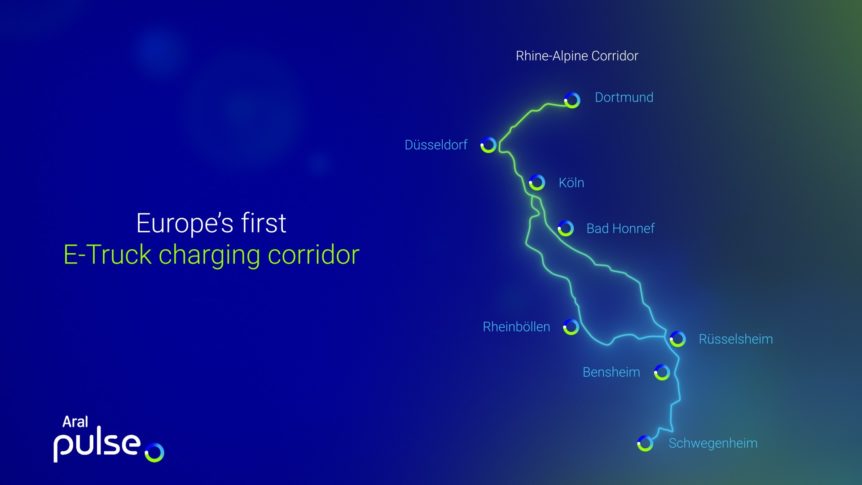Six public charging locations with ultra-fast 300kw charge points aimed at E-Trucks have been launched along a 600km stretch of the Rhine-Alpine corridor across Germany. The corridor is one of the busiest road freight routes in Europe connecting key North Sea ports in Belgium and the Netherlands with the Mediterranean port of Genoa in Italy through a network of roads stretching 1,300km.The new chargers have been installed on Aral retail sites in Germany between the Rhine-Neckar metropolitan area and the Rhine-Ruhr metropolitan region.
Aral is bp’s German retail brand. In the next six months, two additional locations are scheduled to open on Aral retail sites to complete the new charging corridor. Once complete, using the Aral pulse charging corridor, an E-Truck will be able to cover over 600km across Germany along one of European’s major road transport routes.
The 300kw charging stations are each capable of charging more than 20 E-Trucks per charger, each day. An E-Truck’s range can reach up to 200km in around 45-minutes using the ultra-fast charge points.
The Aral retail sites also offer access to hot food, restrooms and showers for drivers to use during a mandatory rest period in addition to dedicated charging in safe, well-lit and convenient locations.
Nigel Head, EV Truck Director, Europe, bp pulse, said, “This is a significant moment for E-Trucks in Europe and an important step in our journey towards helping to decarbonise truck transportation. By electrifying this stretch of the Rhine-Alpine corridor with ultra-fast charging, bp is enabling EV Truck charging beyond ‘back to base’ whilst rapidly learning customer insights which will directly inform our longer-term European network and proposition.”
He continued, “By beginning the roll out of a dedicated charging network for freight operators and fleets, with a focus on major logistics corridors, bp is supporting the electrification of medium and heavy-duty vehicles, decarbonising the movement of goods, as well as people.”
Alex Junge, Aral Board Member for E-Mobility said, “The discussion about e-mobility has been focussed on the passenger car sector, but medium and heavy goods vehicles are also at a decisive turning point. Our strategy is designed to meet this demand with the right infrastructure and our first public electric truck charging corridor in Germany is an important milestone on this path.”
By 2030, it has been estimated that approximately 270,000 battery electric medium and heavy-duty vehicles will be in operation in Europe requiring up to 140,000 public and destination electric charging points.

